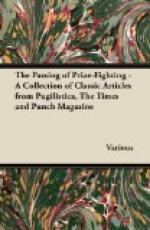At this moment the Highest Authority itself arrived on the scene to have a look at it. He was not in the least discontented with what he saw; he was inclined to congratulate the experts upon their expedition.
“We shall be hard put to it, Sir,” said the C.C., “to be ready for to-morrow.”
“To-morrow?” said the Highest Authority. “Why to-morrow particularly?”
“To-morrow is the 7th, Sir,” said the C.C., with sinister emphasis.
“And what about it if it is?” asked the Highest Authority.
“We have to move in here on April 7th, Sir,” said the C.C., with almost an injured note in his voice.
“Have you?” said the Highest Authority. “Why?”
The experts saluted and moved off, commenting quietly among themselves upon the good sense and magnanimity of the Highest Authority. As for that Camp Commandant—
Yours ever, HENRY.
* * * * *
FOOD BEFORE CLOTHES.
“Exchange Fawn Costume,
slight figure, good condition, for two broody
hens.”—The
Smallholder.
* * * * *
THE HEROINE OF THE NEW NOVEL.
[Illustration: “BUT I CANNOT LINGER THUS WITH YOU, SIR REGINALD,” SAID THE RUSTIC BEAUTY; “I HAVE TO CLEAN THE PIG-STY.” SHE PAUSED, AND THEN ALMOST INAUDIBLY, “YOU MAY HELP ME, IF YOU LIKE.”
SIR REGINALD VAVASOUR’S HEART LEAPT WITHIN HIM.]
[Illustration: AT LAST HE HAD HIS CHANCE. “HOW MUCH IS IT TO THE MARBLE ARCH?” HE ASKED.
“TUPPENCE,” SHE REPLIED SOFTLY; AND THE SIMPLE WORD RANG THROUGH EVERY FIBRE OF HIS BODY.]
[Illustration: DUSK WAS DESCENDING. HIS BACK TYRE WAS PUNCTURED, AND HE WAS ALONE—LOST IN THE WILD MOORLAND. SUDDENLY A CHEERY YOUNG VOICE SMOTE UPON HIS EAR: “WHAT’S UP, OLD CHAP? CAN I BE ANY USE?”]
[Illustration: “OH, I’M SO FEARFULLY SORRY!” SAID A SWEET YOUNG VOICE IN DISTRESSED ACCENTS. AND THEN HE BECAME AWARE OF A DAINTY LITTLE FOOT AND ANKLE COYLY PROTRUDING FROM A BLUE TROUSER ALMOST AT A LEVEL WITH HIS EYE.]
* * * * *
IN MEMORIAM.
FRANCIS COWLEY BURNAND,
1836—1917.
EDITOR OF “PUNCH,” 1880—1906.
Hail and Farewell, dear Brother of the
Pen,
Maker of sunshine for the minds of men,
Lord of bright cheer and master of our
hearts—
What plaint is fit when such a friend
departs?
Not with mere ceremonial words of woe
Come we to mourn—you would
not have it so;
But with our memories stored with joyous
fun,
Your constant largesse till your life
was done,
With quips, that flashed through frequent
twists and bends,
Caught from the common intercourse of
friends;
And gay allusions gayer for the zest
Of one who hurt no friend and spared no
jest.
What arts were yours that taught you to
indite
What all men thought, but only you could




